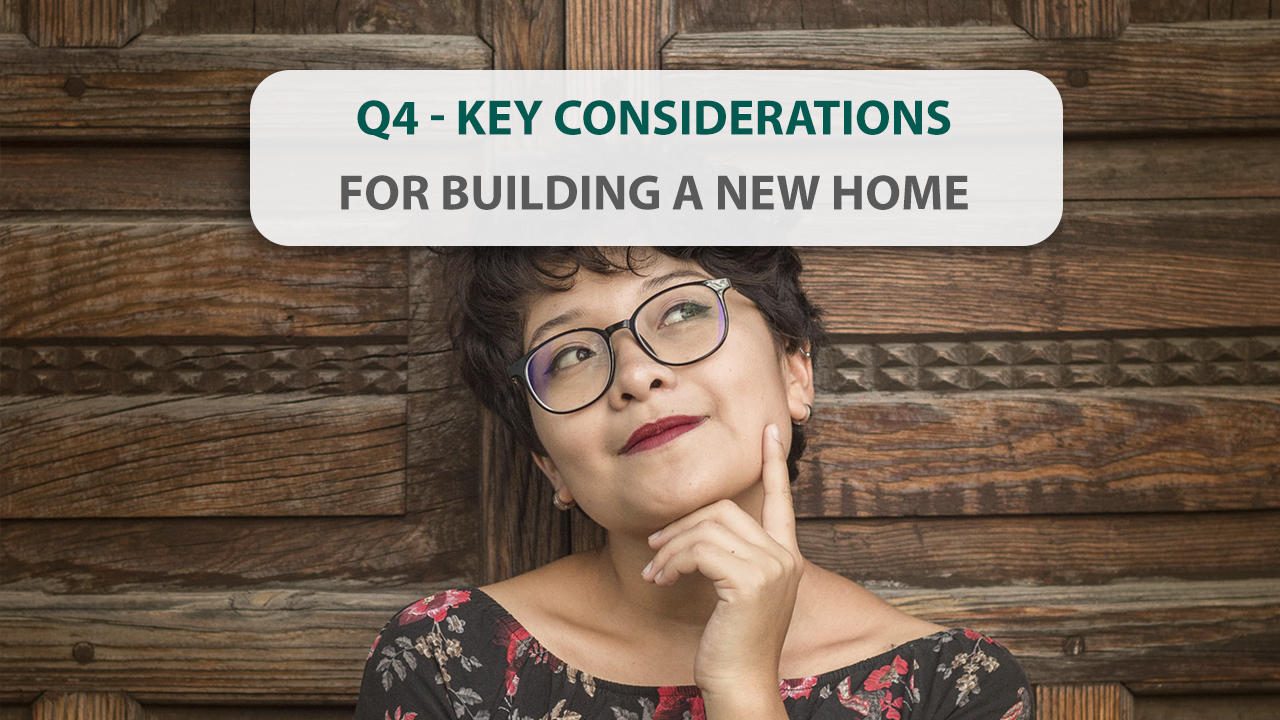Key Considerations for building a new home

Preparation and planning
Prepare and plan your new home
The first step that needs to be done before requesting to build a new home is to prepare and plan – be honest and realistic about the type of home you want to build and take the time to plan for you to get there. Have a carefully laid out structure of new housing ideas that best suit your living needs. This will give you a holistic perspective on how your building journey will go.
Location
Where will best suit you
Have a vision of where you and your family will feel comfortable to live and grow. The location of your new home should align with your work and family preferences. Ensure the location is eligible to be built on, and check land regulations or fees associated with the area. Research the process of obtaining a building permit for your specified location. Have a surveyor check your desired land for water table height, soil type and utility accessibility.
Choosing the right builder
Have a shared and precise vision
Choose a builder that understands your vision and new home requirements. You will know this when you have a builder that makes you feel comfortable sharing your ideas about design elements. Being on the same page when discussing design will ensure that you both achieve this.
To find a builder that best suits your new home:
- research similar designs they have done in the past,
- look at the areas they have previously built in
- pay close attention to their reputation
- review their licencing and accreditation
Understand your build design
Know your new build
This is an important step as it puts your plans into action. Research similar designs your builder has done in the past and physically visit as many of their design homes as you can. Looking at previous designs will help you to understand and discuss tailored opportunities for your living arrangements. Make sure your new design suits your needs and in the future.
This includes checks on:
- having enough bedrooms and bathrooms
- suitable living areas for your family
- front and back yard space
- garage practicality
Financing for your budget
Home loans and hidden fees
Set a budget for your new home build and make it work with your chosen builder and bank. Get a quote or an estimate of how much your new home will cost you from your builder. Discuss home loans and rates with your bank and take the time to understand building and construction loans, as they are different from standard home loans – it may even be worth consulting with a financial advisor. Don’t forget to budget for associated costs with planning and designing your new home.
These costs can include:
- planning and approval fees
- settlement fees
- stamp duty
- builder quotes
Government Grants
The government can help you
Government financial assistance can be given for eligible first home buyers. If you are building to own your first home, check your relative government website for new homeowner grant schemes. Applications for grants covering up to $10,000 can be claimed from the government giving you a head start on your new home savings. 5% deposits for a home can be paid for new home buyers without having to pay lenders mortgage insurance (LMI). Research these grants and communicate this with your bank to give you a significant first home discount.
Council and safety considerations
Get approved and live safely
Check you have development consent and approval to build from your local council. This can also be discussed with your builder but understanding the council requirements and application for building approval gives you a step ahead in the design process and saves you time. Look up processes and preparation for lodging a design application with your respective council and understand the steps to get you building. Consider potential threats that need safety measures for your new build. It is important to consider protection against:
- fire and flood
- inclement weather
- family friendly neighbourhood
Clear, concise communication
Communication is key
Be upfront and clear when communicating to everyone involved in the building process, especially to your builder and bank. Make a checklist for questions to ask or take note of anything that is unclear. Be quick to mention areas that you don’t understand and have them explained informatively to you. Make sure all channels of communication are open to keep you informed throughout this building journey. Communication channels include:
- phone
- social media messaging
Future resale value of the property
Your home could be a treasure
Yes, your new home build is for you and your family, but it is nice to know the potential for return on investment in the future. Look into the property market associated with the area of your new home build and take note of possible price points for properties like yours. Remember, the housing market is continually growing, and the value of your home could substantially rise down the track. If you’re ever curious about this and want an estimate for your home’s value, property valuers can do this for you in your local area.
Take action
Actions speak louder than words
You’ve probably already heard this before, but this statement could not be further from the truth. This process can get overwhelming when thinking and speaking about it but start making moves. The sooner you start the sooner you will have your new home built. Constant communication and design checking with your builder, bank and council will ensure smooth sailing. Many of these actions throughout these steps can be started whilst you are still saving for your deposit.
- Arrange and plan meetings as soon as possible
- Ask questions frequently to help educate you along the way
- Turn your new dream design into your new dream home
